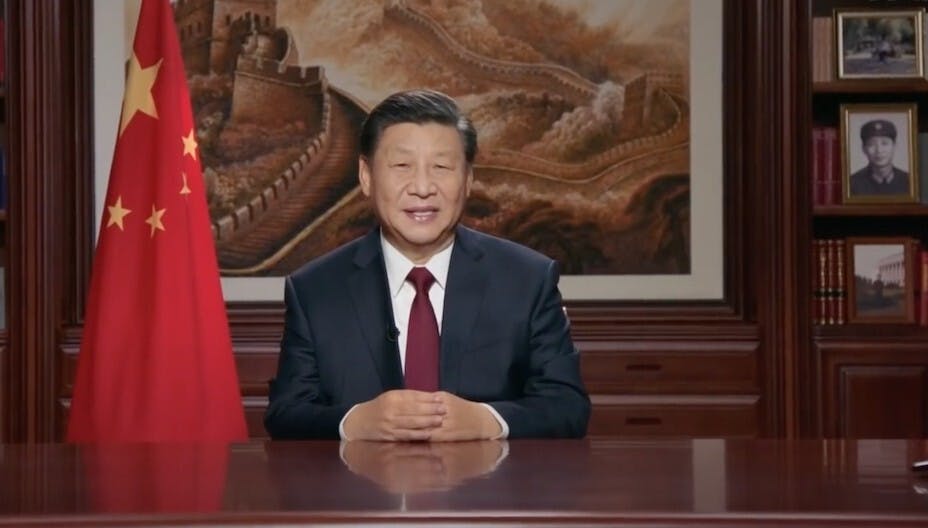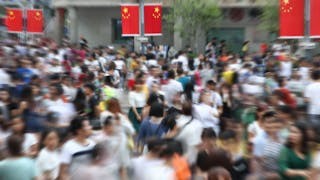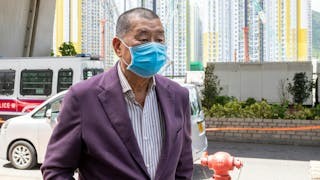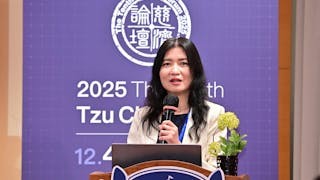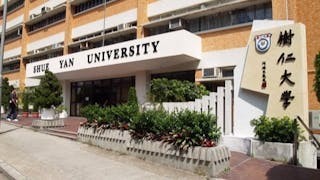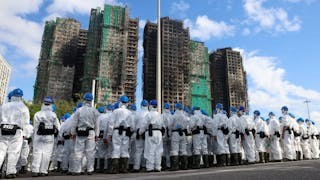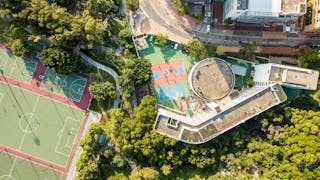中共總書記習近平22日(上周五)在十九屆中央紀律檢查委員會第五次全體會議上發表重要講話,聯繫到早在2020年10月發表的《中國共產黨中央委員會工作條例》(下稱《中央工作條例》),可以看作是試圖在中國的民主集中制體系內嘗試建立一些制衡機制。迄今為止,這種種嘗試不僅被港澳新聞界忽視,而且還被西方新聞界忽視。
習近平與中共中央政治局常委李克強、栗戰書、汪洋、王滬寧、韓正和中紀委書記趙樂際出席了中紀委全體會議。習近平在會上的講話可歸納為以下幾點:
首先,習近平強調,2020年對中國來說是不平凡的一年,但2021年是中國共產黨成立100周年,中紀委必須「堅定不移全面從嚴治黨,堅定不移推進黨風廉政建設和反腐敗鬥爭,堅定不移把黨建設得更加堅強有力」。事實上,反腐敗工作仍在繼續,包括金融管理和證券部門的一些官員被指犯了腐敗罪行並受到懲處。
其次,他呼籲所有幹部和黨員必須圍繞「兩個維護」(維護習近平黨中央的核心、全黨的核心地位,維護黨中央權威和集中統一領導)強化「政治監督」。 除了加強黨的領導和監督外,還要「深化政治巡視」。中共需要監督黨員干部防控疫情的工作。據報道,自2020年2月以來,中共已處分「數千名」未能果斷有效地應對新冠疫情的黨員幹部,其中包括少數濫用權力的幹部。
第三,習近平強調要「破除形式主義、官僚主義,以作風攻堅促進脫貧攻堅」;他又批評一些黨員幹部的「享樂主義、奢靡之風」和「餐飲浪費行為」。
習近平又強調,全面從嚴治黨首先要從政治上看,「不斷提高政治判斷力、政治領悟力、政治執行力」。
總之,中國的政治監督也許是對包括中共中央政治局常委會、中共中央政治局和中共中央委員會在內的最高領導機關悄悄進行改革之舉。 2020年10月發表的《中央工作條例》是中共尋求制度化的舉措,特別是在中共最高層進行一定程度的互相制衡,而在習近平的最新講話和《中央工作條例》中,可以生動地看到中國式的民主集中制。
Political Supervision in China: Checks Within Centralism
An important speech delivered by Xi Jinping, the General Secretary of the Communist Party of China (CPC) of the People’s Republic of China (PRC) at the fifth meeting of the Central Discipline Inspection Commission (CDIC) on January 22, 2021, together with the earlier publication of the CPC Central Committee Work Regulation in October 2020, can be seen as attempts at institutionalizing some checks and balances within the PRC’s system of centralism. These attempts have been so far neglected by not only the media in Hong Kong and Macau but also in the West.
The speech delivered by PRC President Xi Jinping on January 22, when he was accompanied by Politburo Standing Committee members Li Keqiang, Li Zhanshu, Wang Yang, Wang Huning, Han Zheng and CDIC General Secretary Zhao Leji, could be summed up in several aspects.
First, Xi emphasized that while the year 2020 was an abnormal one for the PRC, 2021 is marking the 100thanniversary of the CPC, and as such, the CDIC must “resolutely and comprehensively manage the Party,” “build up a clean Party construction,” and “persist in the struggles against corruption.” The objectives are to “decisively and comprehensively establish a xiaokang(moderately prosperous) society and to eradicate poverty.” In this process, the CPC’s “firm leadership” and “authority” are the backbones of the CDIC work. As a matter of fact, anti-corruption work has been continuing, including some officials who managed the monetary and securities sector were found guilty of corruption and punished.
Second, he appealed to the need for all cadres and party members to enhance “political supervision” by improving the system of strictly monitoring and managing the Party. Apart from the need to establish firm Party leadership, the dispatch of inspection teams from the CDIC at the central level to the provinces and localities must be “deepened.” The Party needs to monitor the work of party cadres in containing the outbreak of Covid-19. Since February 2020, it was reported that the CPC has penalized “several thousand” party cadres for their failure to cope with Covid-19 decisively and efficiently, including the problems of the abuse of power by a minority of cadres, their negligence, their refusal to undergo quarantine work, and their lax attitude toward the implementation of strict quarantine measures. Some cadres were demoted; some were reprimanded; some were seriously warned; and some were dismissed, according to Hong Kong’s Wen Wei Po on January 21, 2021.
Third, President Xi stressed the importance of eliminating formalism, bureaucratism and red tape in the process of poverty alleviation. He criticized those Party cadres for hedonism and luxurious spending on their dinner and banquets. In fact, the CPC in 2019 launched a campaign that emphasized the frugality of Party cadres in their expenditures on dinners and banquets, creating an atmosphere of clean governance. Corruption was reinterpreted broadly as embracing unreasonable expenditure on food consumption so that Party cadres should observe what is the proper and moral conduct in their personal lifestyle and workplace ethics. President Xi added that the objective is to fight against the “protective umbrella” between corrupt party cadres and private-sector businesspeople, because they cultivate personal networks through expensive banquets and dinners. In short, President Xi emphasized the significance of clean governance at the grassroots level, where organized crime elements could and can cultivate personal connections with Party cadres who lack personal ethics.
Fourth, President Xi pointed to the need for all party cadres to enhance their political judgement, sensitivity and capability. Politics in command is the key to the success of anti-corruption work within the CPC, for he identified that “traditional” forms of corruption are now enmeshed with “new forms.” The CPC must persist with its internal rectification campaign to safeguard the longevity of the Party and to prevent its “decay.” A strong sense of crisis consciousness is embedded in the psyche of the CPC’s leading officials constantly.
Fifth, Xi appealed to the need for all Party cadres to maintain “self-discipline,” to “purify” and to “reform” themselves so that their capacity and competence can be improved. In this way, the CPC “can and will not only jump out of the cycle from governance to chaos and from the governing peak to decline,” but also “safeguard the stable and far-reaching big wheels of the Chinese style of socialism.” If superstructure was emphasized by the late CPC leader Mao Zedong to ensure that all Party cadres were imbued with the idea of socialism, the current PRC leadership is determined to attach importance to the superstructure by instilling the spirit of being good and loyal Party cadres who believe in moral virtues and socialism. By being good socialists, Party cadres are expected to be “afraid of being corrupt” and they “cannot expect to be corrupt.”
Sixth, President Xi emphasized that all Party cadres at all levels must “take the lead of respecting and obeying the Party discipline and national laws,” “consciously oppose the thinking of having special privileges,” and “strictly monitor properly their family members, sons and daughters as well as working staff members around them.” A role model is expected to be established among Party cadres. To install checks and balances mechanism against Party cadres, President Xi appealed to the need for the masses to feel that “social justice” exists. Political supervision, according to him, must embrace mass participation, for they can complain against corrupt cadres and expose their improper behavior. While Party cells must observe the CPC discipline, the masses play a crucial role of checking and balancing the CPC members and cadres.
Seventh, President Xi has identified the need for the CDIC staff members and officers to be “recruited, trained and promoted properly with strict constraints and supervision.” He added that the CDIC must focus on the personnel and events, constructing a “comprehensive accountability system and supervision system.” The CDIC and the supervision officers need to have self-discipline while being monitored managerially. Given the fact that a minority of anti-corruption officials are vulnerable to being bribed, President Xi emphasized the need to “resolutely prevent themselves from becoming ‘shady under the light.’” A highly self-disciplined and a high-quality batch of anti-corruption officers with strong loyalty must be established in the year 2021. At the same time, mass participation and supervision are welcome to make political supervision work.
Zhao Leji reiterated President Xi’s emphasis on the need to resolutely monitor the CPC, but he added that Party cadres who enhance their political judgement, sensitivity and capability will ensure the smooth implementation of the 14thfive-year plan.
Analytically, President Xi’s important remarks must be read together with the promulgation of the CPC Work Regulation which was published in October 2020 – a document that has not been covered by the media of Hong Kong, Macau and the West. The CPC Work Regulation was approved by the Politburo on September 28, 2020 and it is composed of 8 Chapters and 33 stipulations.
Chapter 1 covers the main principles, including Article 1 that focuses on the discipline of the members of the Central Committee (CC), and Article 3 that appeals to all CC members to adhere to Marxism-Leninism, Mao Zedong thought, Deng Xiaoping thought, the three represents, and the thought of Chinese socialism under the Xi Jinping era. Article 4 points to the need for the CC members to observe the principles of democratic centralism and resolutely governing the Party.
Chapter Two from Articles 5 to 8 affirm the role of the Standing Committee of the Politburo, the Politburo and the CC as the “brain” in the CPC leadership, with Article 8 emphasizing the consistency of actions and thoughts among all the leading Party members.
Chapter Three from Articles 8 to 13 highlight the elected relationships among the Politburo Standing Committee, Politburo and the CC in which the CC’s General Secretary must be elected from the Standing Committee of the Politburo (Article 10). Article 12 stresses the internal checks and balance mechanism by pointing to the role of the CDIC under the leadership of the Party center.
Chapter Four from Articles 14 to 18 describes the duties and responsibilities of the CC, which needs to listen to the CDIC reports, to manage the Party’s daily affairs, to give opinions to the Politburo on the party-government matters, and to oversee the nomination, recommendation, dismissal of Party cadres.
Chapter Five from Articles 19 to 22 focuses on the leadership style of the CC, which is expected to be “scientific,” “democratic,” “socialist,” “self-revolutionary” and integrative in the relationships between the party members, cadres and masses.
Chapter Six from Articles 23 to 30 concentrate on the decision-making processes of the CC, which is required to meet at least once per year, use majority votes in its decisions, and adhere to two-thirds majority in all decisions relating to discipline. Article 25 stresses that the Politburo convenes as half of its members are present, and that it needs to discuss and decide every matter in the agenda. Article 26 affirms that the Standing Committee of the Politburo meets regularly, and that it requires half of its members present and can invite other officials to attend as observers. As with the Politburo, the Standing Committee needs to discuss and decide each agenda item.
Chapter Seven from Articles 31 to 33 focuses on self-construction, including Article 33 that stresses all members of the CC, Politburo, and the Standing Committee of the Politburo to oppose formalism, bureaucratism, hedonism and luxurious lifestyle – a point made by President Xi in his speech on January 22, 2021. Article 33 emphasizes the importance of democratic centralism in which all members of these three bodies need to stick to CPC discipline and regulations. Moreover, the Politburo must hold annual “democratic life” sessions during which its members discuss important issues, while the CC members and supplementary members are expected to participate actively in all discussions and present their opinions as well as suggestions. As such, President Xi’s speech on January 22 could be regarded as an extension of the CPC Work Regulations published in October 2020.
Most importantly, the mechanism of political supervision has been stressed in his most recent speech. Indeed, the concept of political supervision is not new: President Xi had already emphasized its importance in his previous speeches in December 2018 and February 2019. Nevertheless, the extent of emphases on political supervision by combining the dispatch of inspection teams from CDIC with the self-discipline of Party cadres and the scrutiny from mass participation is perhaps new and noteworthy in his speech on January 22.
In brief, political supervision in the PRC is perhaps a silent move toward reforms at the top level of the Party institutions, including the Standing Committee of the Politburo, the Politburo, and the Central Committee. The publication of the CPC Work Regulation in October 2020 was a move in the Party’s quest for institutionalization, especially some degree of mutual checks and balances at the top level of the CPC. President Xi’s speech on January 21 has added new dimensions to the development of political supervision, emphasizing a multiplicity of self-monitoring mechanisms, including the CDIC work, its work teams being dispatched to various localities, the self-discipline and moral values of Party members, and the bottom-up checks and balances from the masses. As such, a Chinese-style democratic centralism can be seen vividly in both the 2020 Work Regulation and Xi’s most recent speech.
原刊於澳門新聞通訊社(MNA)網站,本社獲作者授權轉載。



